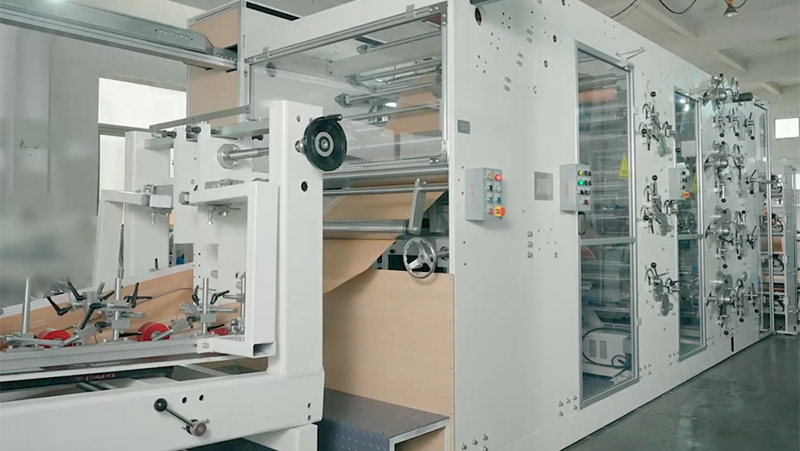Innovations in Recyclable Paper Bag Manufacturing: A Comprehensive Guide to Modern Production Machinery
Release time:2025-05-27 Classification:Knowledge
The global shift toward sustainable packaging solutions has driven significant advancements in the design and functionality of recyclable paper bag machines. These industrial systems represent a critical intersection of environmental responsibility and manufacturing efficiency, offering businesses the tools to produce durable, biodegradable packaging while minimizing waste. This article explores the technical capabilities, operational workflows, and ecological benefits of state-of-the-art recyclable paper bag machinery.

Core Components and Operational Workflow
Modern recyclable paper bag machines integrate precision engineering with automated controls to streamline production. The process begins with the unwinding of recycled paper rolls, which are fed into a printing unit for custom branding or labeling. Advanced machines employ water-based inks and adhesives to ensure full recyclability, avoiding chemical contaminants that compromise material integrity.
Next, the paper undergoes creasing and cutting via laser-guided systems, ensuring millimeter-perfect dimensions for consistent bag shapes. High-speed folding mechanisms then form the base and sides, while ultrasonic sealing technology replaces traditional heat-based methods to reduce energy consumption. Final stages include handle attachment (for totes or carriers) and automated quality checks using AI-powered vision systems to detect defects.
Key Advantages of Recyclable Paper Bag Machines
- Sustainability Compliance: By utilizing post-consumer recycled paper and biodegradable adhesives, these machines align with international standards for circular economy practices.
- Scalability: Modular designs allow manufacturers to adjust production speeds (ranging from 50 to 500 bags per minute) and switch between bag sizes without downtime.
- Cost Efficiency: Reduced material waste, coupled with energy recovery systems, lowers operational expenses over time.
- Customization Flexibility: Adjustable parameters support diverse bag styles—including flat, satchel, and twisted-handle configurations—to meet market demands.
Technical Innovations Driving the Industry
Recent breakthroughs have elevated recyclable paper bag machines beyond conventional capabilities. For instance, IoT-enabled sensors now monitor real-time data on machine performance, predicting maintenance needs to prevent unplanned outages. Additionally, hybrid power systems—combining electric and pneumatic actuators—cut energy use by up to 30% compared to older models.
Another critical development is the integration of closed-loop material recycling. Excess paper trimmings are instantly shredded and reintroduced into the production line, achieving near-zero waste. This feature is particularly valuable for facilities aiming to meet stringent carbon neutrality targets.
Applications Across Industries
Recyclable paper bag machines cater to a broad spectrum of sectors:
- Retail: Durable, branded bags for groceries, apparel, and luxury goods.
- Food Service: Grease-resistant variants for takeout and bakery items.
- Logistics: Reinforced designs with higher weight capacities for e-commerce shipments.
The adaptability of these systems ensures compliance with regional regulations, such as single-use plastic bans, while maintaining aesthetic and functional appeal.
Quality Assurance and Certification
To guarantee output reliability, leading recyclable paper bag machines incorporate multi-stage inspection protocols. Tensile strength testers verify load-bearing capacity, while moisture sensors ensure bags withstand humid environments. Certifications like FSC (Forest Stewardship Council) and ISO 14001 further validate environmental claims, providing businesses with credible marketing leverage.
Future Trends and Industry Outlook
As consumer demand for eco-friendly packaging surges, manufacturers are investing in R&D to enhance machine versatility. Emerging trends include:
- Bio-based Coatings: Plant-derived barriers to replace plastic laminates.
- AI-Optimized Designs: Algorithms that adjust material usage based on real-time demand forecasts.
- Decentralized Production: Compact, portable units enabling localized bag manufacturing to reduce transport emissions.
Recyclable paper bag machines stand at the forefront of sustainable industrial innovation. By merging ecological priorities with cutting-edge automation, these systems empower businesses to transition seamlessly toward greener practices without sacrificing productivity or profitability. As technology evolves, their role in reshaping global packaging standards will undoubtedly expand, solidifying their status as indispensable assets in the circular economy landscape.






